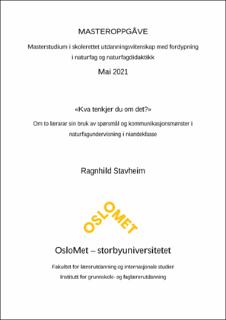«Kva tenkjer du om det?» - Om to lærarar sin bruk av spørsmål og kommunikasjonsmønster i naturfagundervisning i niandeklasse
Master thesis
Published version
Permanent lenke
https://hdl.handle.net/11250/2789087Utgivelsesdato
2021Metadata
Vis full innførselSamlinger
Sammendrag
Ein lærar stiller mange spørsmål i løpet av ei undervisningsøkt, og desse spørsmåla har betyding for den vidare klassesamtala. Hensikta med denne oppgåva er difor å undersøkje lærarar sin spørsmålsbruk i naturfagundervisning, og kva dette har å seie for klassesamtala og elevane sine bidrag. Ut i frå hensikta er det utleia følgjande forskingsspørsmål:
1. Kva spørsmålskategoriar nyttar lærarane seg av i naturfagundervisning?
2. Kva kommunikasjonsmønster legg lærarane opp til i naturfagundervisninga?
3. Korleis reflekterer lærarane kring spørsmål dei nyttar i naturfagundervisning?
4. Korleis reflekterer lærarane kring kommunikasjonsmønstera og elevresponsen som følgjer?
Studien har ei kvalitativ tilnærming, og byggjer på eit sosiokulturelt perspektiv der språket og kommunikasjonen står sentralt i læring og utvikling. Datamaterialet er innhenta gjennom observasjon av tre undervisningsøkter hjå to niandeklasselærarar, samt intervju med desse lærarane i etterkant. Spørsmåla nytta i undervisninga er analysert i to trinn. Meir overordna i fyrste trinn, før dei faglege spørsmåla er analysert etter kategoriar av Myhill (2006) og Myhill og Dunkin (2005) i trinn to. Vidare er kommunikasjonen analysert ut i frå Mortimer og Scott (2003) sine dimensjonar for kommunikativ tilnærming, samt IRE- og ulike IRF-mønster. Funna viser at lærarane stiller mange spørsmål, og med det har ein høg spørsmålsfrekvens i undervisninga. Av dei faglege utgjer faktaspørsmåla den største delen, medan spørsmål som utfordrar og ber elevane setje ord på tenkjeprosessen er mindre nytta. Det viser seg at lærarane sine spørsmål har betyding for klassesamtala, både organisering og innhald, samt elevane sine bidrag. Samstundes kjem det fram at det også er fleire faktorar som kan verke inn. Spørsmåla er viktige for elevane si læring, og mogleggjer læring og utvikling gjennom språket og samtala. Å bli bevisst spørsmåla sin nytteverdi i naturfagundervisninga, og i elevane si læring, viser seg da å vere viktig. «What Are Your Thoughts About That? » – about two teachers use of questions and patterns of communication in science education in ninth grade. A teacher asks a lot of questions during a teaching session, and these questions have significance for the following class discourse. The purpose of this thesis is therefore to “explore teachers use of questions in science education, and what this has to say for class discourse and students’ contributions”. Based on the purpose, the following research questions have been derived:
1. Which question categories does teachers use in science education?
2. What patterns of discourse does teachers set up in science education?
3. How does the teachers reflect on questions they use in science?
4. How does the teachers reflect on the patterns of communication and the student response that follows?
The study uses a qualitative approach and build on a sociocultural perspective, where language and communication are central in learning and development. The research material was obtained through observation of three teaching sessions with two ninth-grade teachers, followed by an interview. The questions used are analyzed in two steps. They are analyzed more overall in the first step, before the scientific questions are analyzed after categories made by Myhill (2006) and Myhill and Dunkin (2005) in step two. The communication is analyzed based on Mortimer and Scott’s (2003) dimensions for communicative approach, as well as IRE- and various IRF-patterns. The findings show that the teachers ask a lot of questions, and thus have a high frequency of questions. Of the science related questions, factual questions are most frequently used, while questions that challenge and ask students to explain their thinking are less used. The results indicate that the teachers’ questions affect the classroom discourse, both organizing and content, as well as the students’ contributions. At the same time, it appears that also other factors affect the classroom discourse and student contributions. The questions are thus important for the students learning and enable learning and development through language and discourse. Becoming aware of the question’s value in teaching and in students learning, proves to be important.
